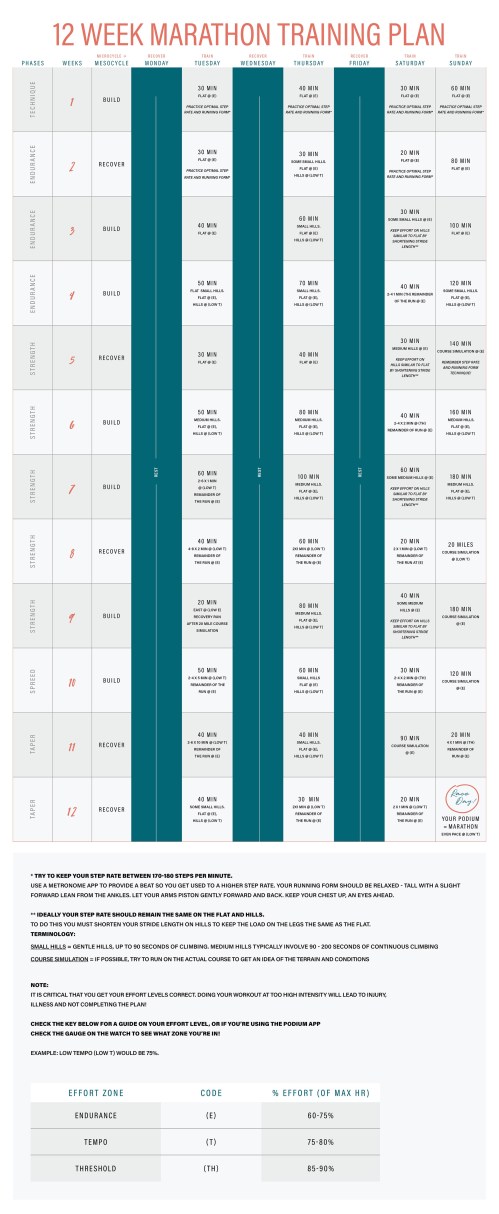No matter how seasoned of a runner you may be, getting ready for a marathon takes some work—most people can’t wake up on the morning of race day and clock in a cool 26.2 (although I actually did once have a boyfriend who did that, and it was one of the more impressive things I’ve ever seen in my life). Even if you are one of those people who can run a marathon like it ain’t no thang, your body—and the potential injuries you could wind up with—could certainly benefit from an appropriate amount of prep, so the pros recommend a 12-week marathon training plan to help get your body into tip-top shape.
“Twelve weeks is the magic number; it’s neither too long or too short,” explains Jon Ackland, co-founder and chief science officer of Performance Lab, the company behind running and coaching app Podium. “Your body needs at least six weeks to develop a base level of fitness, and you need a longer timeframe to increase training volumes gradually, without massive jumps in the duration of your long workout. If you make that jump too quickly, you’re more at risk of injury or illness.”
The problem with attempting a program that’s longer than 14 weeks, is that you may wind up with cumulative fatigue or losing motivation before you actually reach race day. “The thing I love about a 12-week plan is that it jumps right into the meat of training,” says coach Melanie Kann of New York Road Runners, who offer their own version of a 12-week marathon training plan. “With a 20-week plan, there’s a longer aerobic base-building phase involved, and a gradual introduction of speed work before really piling on the mileage. That’s wonderful if you’re coming from a place where you need to build that foundation, but if you’ve already got that deep base in place and if you’re already doing some sort of speed work weekly, you’ll require a shorter ramp up and can dig right in without running the risk of overtraining.”
While a 20-week regimen is a solid option for first-time marathoners who are starting from square one, a more confident runner should start their program 12 weeks out, especially if they’ve already done a half marathon. If you’re already able to run continuously for 60 minutes, you’re likely a good candidate for the 12-week plan.
What does a 12-week marathon-training plan entail?
For starters, a lot of running. But running isn’t the only thing that a 12-week marathon training plan requires: There are a few other things you should plan to build into your program, too. First up? Cross training. “While training for the marathon, we also recommend not doing additional exercise that’s hard on your legs, such as weightlifting or excessive plyometrics,” says Ackland, suggesting that you use your non-running days to focus on building strength in your core and upper body. “A strong core will strengthen the platform which you run off (your pelvis) and translate to your running efficiency.” Just be sure to leave a solid time gap between an intense core session and a big run so that it doesn’t affect your training.
And as with all fitness modalities, recovery is critical when it comes to running a successful marathon. “When you train, you create load on the body. When you recover, your body is able to adapt to that load to increase your abilities,” explains Ackland. “If you don’t recover, you end up tired and your body has a hard time absorbing the training you’ve done.” If you’re on a good program (like the one Podium has shared with us, below) rest days and recovery are already built in. To be sure you’re getting the most out of it, it’s also important to integrate stretching, foam rolling, and maybe even some sports massage into your routine.
How to stay motivated throughout your 12-week marathon training plan
Throughout the 12-week marathon training plan, you’ll rely on both internal and external factors to keep you from burning out. You’ll want to be sure you’re genuinely passionate about the goal you’ve set for yourself, which will help you work toward the finish line. And having a support system to rely on throughout the process doesn’t hurt either. “Find someone who has been there before to help guide you—like a coach or personal trainer—who can personalize the training and provide valuable feedback on your performance,” says Ackland. Also, consider finding a running buddy, because as Ackland puts it, “Training for an event like this can be a great opportunity to share a unique experience with your friends and bond over the shared sweat sessions.”
Surfing the web can help, too. “The internet is an incredible resource—so, use it,” advises Kann. “Study your course map, the elevation changes, see if anyone has posted a video online of the course.” He’s also a fan of going old-school and putting a calendar up on the wall so that you can put an X through every day that you’ve run “See how may Xs you can rack up. I bet you won’t want to break that chain,” he says.
And on race day, Ackland has one critical piece of advice that will help keep you going. “It’s useful to think of it as a 18-mile warm up and 8-mile running race,” he says. “You can go into it knowing that around the 18 mile mark there’s going to be an ambush, and you have to have run at a pace that will prepare you for the hard bit. It’s a good way to approach the event in terms of how you think it will play out.”
How to read your 12-week marathon training plan
Unlike traditional marathon training programs, the one Podium created for us clocks your runs as duration instead of distance so that you’ll be able to know exactly how to fit them into your schedule. You’ll work through “mesocycles” (aka your week-to-week recoveries) and “microcycles” (aka day-to-day recoveries) to make sure you have time to absorb the training and move through any accumulated fatigue.
There are five different training phases laid out in the 12-week marathon marathon training plan, according to Ackland:
Training Phase 1- Technique: The first week focuses on your running form and helping you find the optimal step rate. Good technique helps you become a more efficient runner, with a lower chance of injury.
Training Phase 2- Endurance: This phase is all about improving your ability to ‘last the distance’. Your long runs (Sunday) are some of the most important workouts in your plan, so try not to miss them.
Training Phase 3- Strength: The next step is about increasing your ability to sustain energy during the event. We do this with hill training. Focus on shortening your stride and keeping your leg turnover up. People often run harder on hills than they need to.
Training Phase 4- Speed: These runs involve speed intervals and will improve your ability to get used to “racing” in the event. Speed work is taxing and should be done sparingly, that’s why it’s introduced at the end in preparation for the event.
Training Phase 5- Taper: The final phase involves backing off slightly to make sure you’re rested for race day. The workout intensity is kept up but volume drops off, to help you physically and mentally recover for the event.

This is what running the 2019 New York City Marathon taught our fitness director, Ali Finney, about her body. Plus, advice every marathon runner should read the week before their race day.
Sign Up for Our Daily Newsletter
Get all the latest in wellness, trends, food, fitness, beauty, and more delivered right to your inbox.
Got it, you've been added to our email list.











